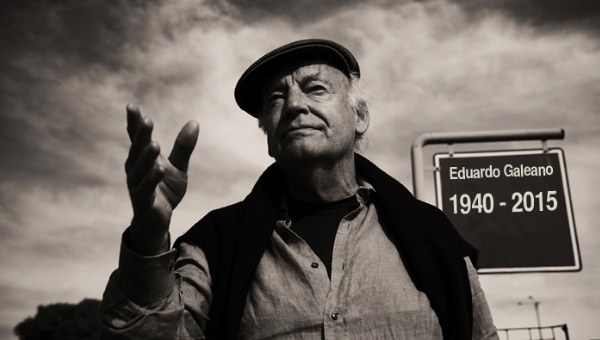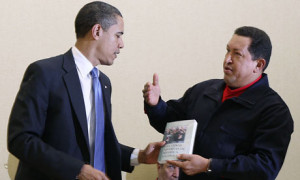by Jo Morley, Postgraduate Student on the SAS Human Rights Consortium MA in Understanding and Securing Human Rights
 April 2015 brought the news that Eduardo Galeano, whose seminal book The Open Veins of Latin America established him as one of the region’s most prominent writers, had died. Leaders from all over the Latin American continent paid tribute to ‘a maestro of the liberation of the people’ (Bolivia’s Evo Morales). Brazil’s Dilma Rousseff said ‘May his work and example of struggle stay with us and inspire us each day to build a better future for Latin America’. Since its publication in 1971 Open Veins, a chronicle of centuries of economic exploitation and underdevelopment has sold more than a million copies worldwide (Democracy Now, 14th April). Galeano wrote that:
April 2015 brought the news that Eduardo Galeano, whose seminal book The Open Veins of Latin America established him as one of the region’s most prominent writers, had died. Leaders from all over the Latin American continent paid tribute to ‘a maestro of the liberation of the people’ (Bolivia’s Evo Morales). Brazil’s Dilma Rousseff said ‘May his work and example of struggle stay with us and inspire us each day to build a better future for Latin America’. Since its publication in 1971 Open Veins, a chronicle of centuries of economic exploitation and underdevelopment has sold more than a million copies worldwide (Democracy Now, 14th April). Galeano wrote that:
‘Latin America is the region of open veins. Everything, from the discovery until our times, has always been transmitted into European – or later United States – capital, and as such has accumulated in distant centres of power. Everything: the soil, its fruits and its mineral rich depths, the people and their capacity to work and to consume, natural resources and human resources’. The continent is ‘painfully aware of the mortality of wealth which nature bestows and imperialism appropriates…Development develops inequality’.

Hugo Chávez presents Open Veins to Barack Obama
Galeano’s death is an opportunity to reflect on the colonial legacy, imperialist development doctrines, and the failures of the neoliberal experiment that continue to burden Latin America to this day. Many authors comment that experience in Latin America highlights the ‘failings and abuses of development’ (Mowforth 2014) and the ways in which development policy has been used politically to justify what Gustavo Esteva refers to as the ‘new colonial episode’.
While Galeano and others have argued that the intention of the development age was Western capitalist domination and access to the natural resources of the rest of the world (Mowforth, 2014 p.2), today we cannot ignore that poverty in the region was cut by nearly half during the last decade, according to a 2014 report by the United Nations Development Programme (UNDP). This may be attributed somewhat to the rise of the so-called ‘Pink Tide’ and ‘Leftist’ governments in Latin America (namely Venezuela, Ecuador, Bolivia and Brazil and Argentina), some of whom have challenged the neoliberal policies imposed on them and who brought changes in social policies, moving to address poverty and inequality mainly through nationalisation and state-ownership of natural resources.
At the international level too, policy has moved towards human rights-based approaches to sustainable development and the fulfilment of access to economic and social rights. Within development agencies that have adopted a human-rights based approach, debate continues about how much focus should be placed on the role of both states and non-state actors including development agencies and multinational corporations (MNCs), and to consider their accountability. Many development agencies are now involved in service-delivery, capacity building and advocacy for rights as well (Gready and Vandenhole, 2014).
These international developments have been informed by a body of Development literature from authors including Amartya Sen, William Easterly, Joseph Stiglitz, Paul Collier and Jeffrey Sachs. Highlighted in this literature are the unequal power dynamics within international development institutions and the limitations that they place on governance issues and on establishment of just and fair policies. In light of this it is easy to see why international financial institutions (IFIs) continue to impose economic development models focused on the extraction and exploitation of the region’s human and natural resources on Latin American countries. These policies promote plantation agriculture, privatisation of water and sanitation, large-scale energy and mining development, timber extraction and many other projects seen to embody ‘development’. Multiple examples from across Latin America demonstrate that local social and environmental concerns are subordinate to economic concerns, both for governments trying to leverage economic growth out of their natural resources and for MNCs and IFIs seeking to consolidate forms of neoliberal governance (Sawyer and Gomez, 2014).
According to Martin Mowforth (2014) globalisation over the last two decades, predicated on a Western capitalist model of neoliberal economic development, has been imposed with such violence as to be rendered ‘unbearable to many of the region’s population, as well as unjustifiable’. According to the UNDP in 2014 38% of the Latin American population remains ‘vulnerable’ to falling into poverty, with 200 million people earning between $4 and $10 per day. The UNDP also acknowledged that the region lacks social protection, which could hinder poverty reduction.
As the international community negotiates the final content of the Sustainable Development Goals, the lessons of Latin American development policies, their impact on the region’s perpetual inequality, and the violent conflicts that continue to characterise development projects in Latin America (Mowforth, 2014) should all be considered in creating protections for the most vulnerable and the most marginalized. Only then will it be possible to realise Ban Ki Moon’s vision for the post-2015 development agenda: ‘A life of dignity for all’.
References:
- Gready, P., Vandenhove, W. (eds) (2014) Human Rights and Development in the New Millennium. Rutledge. London.
- Sawyer, S., Gomez, T. (eds) (2014) The Politics of Resource Extraction: Indigenous Peoples, Multinational Corporations, and the State. United National Institute for Social Development. Palgrave macmillan, New York.
- Galeano, E. (1971) The Open Veins of Latin America: Five Centuries of the Pillage of a Continent. Serpent’s Tail. London
- Democracy Now. ‘Remembering Eduardo Galeano, Champion of Social Justice & Chronicler of Latin America’s Open Veins’ Democracy Now. 14th April 2015.
Available at: http://www.democracynow.org/2015/4/14/remembering_eduardo_galeano_champion_of_social - Oleanga, M. (2014) ‘Poverty in Latin America: One-Third of Region’s Population At Risk of Falling Into Poverty’. Latin Post. 27th August 2014. Available at: http://www.latinpost.com/articles/20100/20140827/poverty-latin-america-one-third-regions-population-risk-falling-poverty.htm
- Mowforth, M. (2014) The Violence of Development: Resource Depletion, Environmental Crises and Human Rights Abuses in Central America. Pluto press. London.


Recent Comments